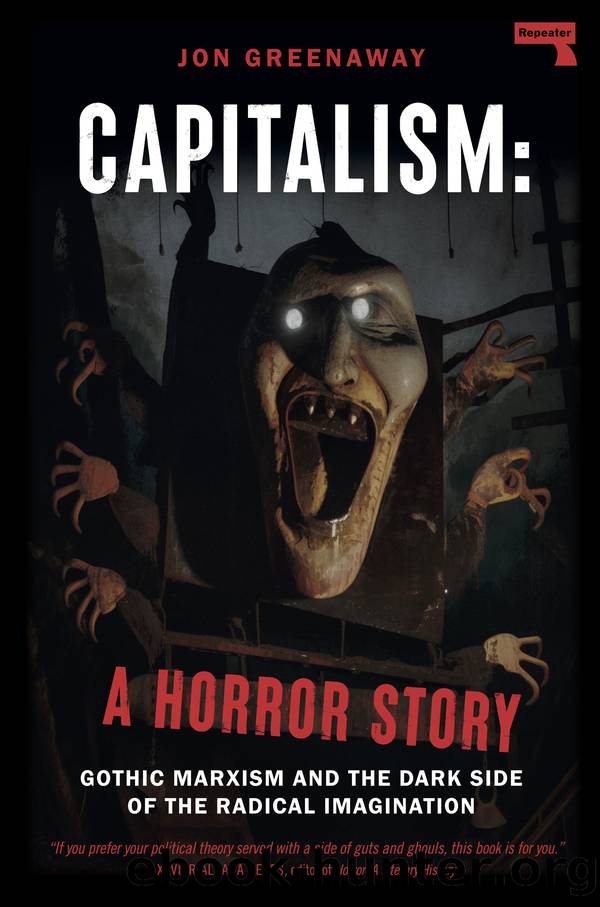Capitalism by Jon Greenaway

Author:Jon Greenaway [Greenaway, Jon]
Language: eng
Format: epub
ISBN: 9781915672247
Publisher: Watkins Media
Published: 2024-04-14T23:00:00+00:00
CHAPTER SIX
GHOSTS AND THE HAUNTING OF MODERNITY
The previous chapter talked about the importance of monstrosity as a metaphor for the current political moment. As Paul Preciado points out, the discursive metaphor of monstrosity is useful and necessary in precisely the ways it allows for new modes of knowledge and new ways of life to find cogent expression. Another common metaphor that we have internalised at the current conjuncture of modernity is that of the cloud. This is an architectural and spatial metaphor that structures our contemporary relationship to technology and is absolutely ingrained in the realities of our day-to-day life. Computational and connected systems make up our shared social space, which increasingly comes to reflect that same set of technologies, being heavily privatised, capitalistic, and monitored by corporate power. In a sense, the internet is difficult to discuss â after all, one of the challenges for any mode of cultural analysis is to be aware of that which increasingly seems natural. The internet is in so many ways part of the very architecture not just of our social lives but of our worlds â all of culture is, as James Bridle puts it, a code/space, a geography enmeshed with the technologies of the digital age.1 Bridleâs book on the internet, New Dark Age, takes its title from a famous line from H. P. Lovecraftâs short story âThe Call of Cthulhu,â which proposes a bleak vision of knowledge completely overwhelming human subjectivity. As the opening of the story puts it:
The most merciful thing in the world, I think, is the inability of the human mind to correlate all its contents. We live on a placid island of ignorance in the midst of black seas of infinity, and it was not meant that we should voyage far. The sciences, each straining in its own direction, have hitherto harmed us little; but some day the piecing together of dissociated knowledge will open up such terrifying vistas of reality, and of our frightful position therein, that we shall either go mad from the revelation or flee from the deadly light into the peace and safety of a new dark age.2
We think of the internet as intangible â as a cloud â but it is a very carefully constructed, complex, and fundamentally concrete object. We are inside of it, perpetually â from our data being harvested and sold to advertisers, to facial recognition, to the computer banking services that process billions of credit card purchases, all the way up to the infrastructure that underpins the exploitation of the global stock market and the American war machine. A problem arises, of course, when two things start to happen: when the structure that we are within runs up against the limitations and antagonisms of capital, and when the sheer weight of accumulated history becomes too difficult to ignore. Preservation and history are difficult to maintain on the internet. From constant updates to every major website, to the more prosaic issue of link decay, the internet is both permanent, massively distributed, and at the same time phenomenally fragile.
Download
This site does not store any files on its server. We only index and link to content provided by other sites. Please contact the content providers to delete copyright contents if any and email us, we'll remove relevant links or contents immediately.
| Anarchism | Communism & Socialism |
| Conservatism & Liberalism | Democracy |
| Fascism | Libertarianism |
| Nationalism | Radicalism |
| Utopian |
The Secret History by Donna Tartt(19086)
The Social Justice Warrior Handbook by Lisa De Pasquale(12190)
Thirteen Reasons Why by Jay Asher(8909)
This Is How You Lose Her by Junot Diaz(6886)
Weapons of Math Destruction by Cathy O'Neil(6279)
Zero to One by Peter Thiel(5801)
Beartown by Fredrik Backman(5754)
The Myth of the Strong Leader by Archie Brown(5507)
The Fire Next Time by James Baldwin(5442)
How Democracies Die by Steven Levitsky & Daniel Ziblatt(5218)
Promise Me, Dad by Joe Biden(5153)
Stone's Rules by Roger Stone(5087)
A Higher Loyalty: Truth, Lies, and Leadership by James Comey(4962)
100 Deadly Skills by Clint Emerson(4925)
Rise and Kill First by Ronen Bergman(4788)
Secrecy World by Jake Bernstein(4753)
The David Icke Guide to the Global Conspiracy (and how to end it) by David Icke(4717)
The Farm by Tom Rob Smith(4507)
The Doomsday Machine by Daniel Ellsberg(4490)
